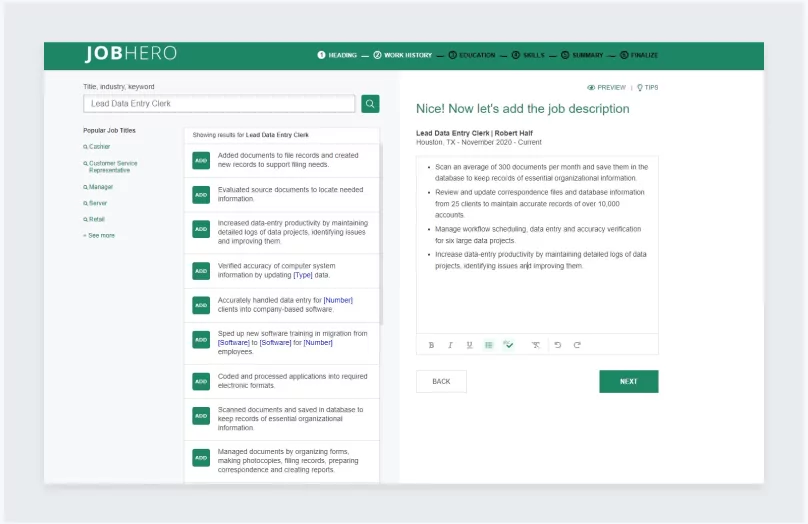What is an Infrastructure Manager?
An Infrastructure Manager is a type of Project Coordinator who specializes in computer network infrastructures. They are responsible for things like managing IT employees, making sure network costs are on budget and serving as a liaison between IT staff and project stakeholders. Infrastructure Managers are employed anywhere that has a large, self-contained network of devices. This can be large organizations and government agencies. Infrastructure Managers can also work for an IT Management firm, where they maintain a list of several clients.
The role of Infrastructure Manager is a management position. They typically have a Bachelor’s degree in Computer Science, Information Systems, Project Management or a related field. According to the National Bureau of Labor Statistics, demand for Infrastructure Managers is set to rise 15 percent through 2024.
Need a strong cover letter can help set you apart from the completion. Our professional cover letter builder shows you how.

Create your professional resume in just minutes.
- Choose from 20+ recommended templates
- Add pre-written experiences, skills and summary
- Download and send
Infrastructure Manager Duties and Responsibilities
Manage IT Infrastructure and Security to Maximize Uptime and Protection of Data
Define, Measure and Meet Key Operational Metrics
Establish Strategic Direction for Operating Systems
Partner With and Influence Stakeholders to Promote Simplification, Standardization and Innovation
Maintain Logs, Documentation and Reports of Activity
Infrastructure Manager Skills
Although the role of Infrastructure Manager is highly technical, those who succeed in this role must also possess certain soft skills. The technical aspect of this role requires advanced knowledge in the principles of information technology, as well as the hardware necessary for building a network. It also requires intricate knowledge of operating systems like Microsoft Windows and Linux. On the softer side, succeeding as an Infrastructure Manager requires someone who can flip-flop between seeing the big picture and focusing on minute details. It also requires the ability to work with, and speak in front of, others. We researched several Infrastructure Manager job descriptions to determine which skills you’ll need to possess in order to find a job as an Infrastructure Manager.
Core Skills: The following skills were listed as core requirements by all of the job descriptions in our research.
- Proficiency with operating systems and network security protocols
- Ability to see the big picture
- Problem solving skills
- Analytical skills
- Organizational skills
- Written and verbal communication skills
- Presentation skills
- Risk management skills
- Attention to detail
- Project management skills
Advanced Skills These skills were not listed as requirements by most employers, but some employers listed them as skills possessed by their ideal candidate.
- Negotiation skills
- Advanced coding skills
- Public speaking skills
Tools of the Trade There are several different types of software tools Infrastructure Managers use to do their job. The following is a list of a few of these tools.
- Database management system software, such as Apache Cassandra or Apache Hadoop
- Development environment software, such as Eclipse software
- Enterprise resource planning software, such as Microsoft Dynamics AX
- Object or component-oriented software, such as Borland Paradox
- Web development software, such as Adobe Flex or Apache Tomcat
GO PRO
Choose from fully customizable
GET PAST THE BOTS
Ensure compatibility with Applicant Tracking Systems
LOOK YOUR BEST
Save time with sleek and stylish professional design templates

Infrastructure Manager Salary
Infrastructure Manager Resources
If this information has piqued your interest in building a career as an Infrastructure Manager, then check out this list of resources we compiled to aid your exploration.On the Web
Around the Storage BlockAround the Storage Black is a blog affiliated with Hewlett-Packard Enterprises. It contains articles related to all things data storage, and it is an excellent resource for anyone who works in Information Technology.
Dell EMCThis is Dell’s Information Technology blog. Its contributors feature Michael Dell, CEO of Dell Technologies, as well as several other talented Dell executives.
CIO DashboardWritten by Chris Curran, the CIO Dashboard has excellent insights into the role of information technology in business. Although only updated monthly, the content quality is top-notch.
Professional Groups
Information Systems Security AssociationThe ISSA is an international organization for all types of Information Systems professionals. It has scores of webinars, publications and other educational resources for its members.
Books
Enterprise 2.0: New Collaborative Tools for Your Organization’s Toughest ChallengesWritten by Andrew Mcafee, this book discusses how the evolution of the web has affected the evolution of business. It also presents tools to use in business that capitalize on these developments.
Getting Started in the Information Technology FIeld: With or Without a Technical degreeWritten by Gale R Stafford, this book is a great general resource on finding employment in the information technology field.
Information Technology: A New Era?This is a free book offered by The Open University, and it is discusses the latest trends in information technology. It is a great resources for an aspiring Infrastructure Manager.
Infrastructure Manager Resume Help
Explore these related job titles from our database of hundreds of thousands of expert-approved resume samples:



